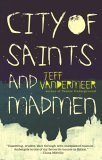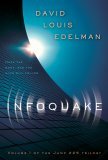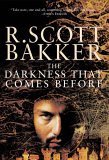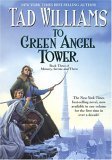The Year In Review
This blog still hasn’t seen its one-year anniversary (which will come in February), but I have posted reviews here of most of the books I’ve read during the year of 2006 and even a few from 2005. It really has been a great year here at Nethspace – in November I saw the 5000th visit and 10,000 page views was exceeded in October (this does not count visits and views from RSS readers). I posted
41 reviews, a lesser number of
rants and other posts, and conducted my first author
interview with
Sean Williams. I’ve started doing reviews at
FantasyBookSpot and have managed to get several review copies from
Pyr. I’m quite happy with how things are and where they seem to be going.
For me, I consider this year to a slow year – it looks like I’ll finish at just under 40 books read for the year. Last year the number was 43, and I have general goal of reaching 50 every year. Looking ahead, I actually think I’ll have a bit less reading time next year, but I still expect to read over 30.
Many websites and other organizations like to have a year’s best list. To be honest, I’m terrible at making lists, and will almost certainly never create an all-time favorites list. However, I will give you the top 11 books that I read this year. Why 11 – because everyone does 10, it’s time to give a bit of respect to 11. They are not really in any particular order since I liked each book for its own reasons and I am not entirely comfortable comparing them directly to each other. Know that it is entirely my opinion based on how I felt about the book, its quality, and my enjoyment while reading it (the full reviews are linked). Some were published this year and others were published in previous years.
Nethspace’s Top 11 Reads of 2006
 Forever
Forever by Pete Hamill
This is the story of New York City from its beginnings to modern times told through the eyes of an immortal Irish immigrant. The city itself becomes a powerful character.
 The Scar
The Scar by China Miéville
The world of Bas-Lag is a dark, macabre place that is brought vividly to life by Miéville. This story takes place on the high seas where the floating pirate city of Armada seeks to harness unfathomable power.
 The Forever War
The Forever War by Joe Haldeman
The horrors of war are told by Vietnam veteran Haldeman as the human race faces off against an alien race throughout the galaxy. Parallels of today cannot be ignored in this classic of science fiction.
 City of Saints and Madmen
City of Saints and Madmen by Jeff VanderMeer
This is a mosaic novel set in the VanderMeer’s city of Ambergris. The stories are darkly uncomfortable, powerful, and stylistic. If I had to pick a number one read for the year, this would be it.
 Red Mars
Red Mars by Kim Stanley Robinson
The colonization of Mars is told as only Kim Stanley Robinson can. My wife is a planetary geologist who studies Mars, as are many of my friends – this is Mars colonization for Mars scientists (and you too).
 Kafka on the Shore
Kafka on the Shore by Haruki Murakami
The winner of the
2006 World Fantasy Award is a beautifully told story of the journey of an adolescent in Japan. There is so much here that it will say different things to different people at different times.
 His Majesty’s Dragon
His Majesty’s Dragon by Naomi Novik
A fun novel in an alternative past where dragons are powerful weapons of war. The Napoleonic Wars have never looked like this.
 Bangkok 8
Bangkok 8 by John Burdett
This is not a SFF book, but still one of my favorite reads. Thai noir – an engrossing view of Bangkok and the people of Thailand.
 Infoquake
Infoquake by David Louis Edelman
Science fiction meets the corporate board room in a distant future – a wonderful debut.
 The Prince of Nothing Trilogy
The Prince of Nothing Trilogy by R. Scott Bakker
I know that this is three books and not just one – but it is one story. This is probably the best completed epic fantasy I’ve ever read. Think crusades, think jihad – a holy war at its worst with a greater conflict looming.
 The Crooked Letter
The Crooked Letter by Sean Williams
A wonderfully dark fantasy unlike any I’ve read before. Twin brothers, gods and monsters, a love triangle, and the cataclysmic end of the world – a great read.




 Forever
Forever The Scar
The Scar The Forever War
The Forever War City of Saints and Madmen
City of Saints and Madmen Red Mars
Red Mars Kafka on the Shore
Kafka on the Shore His Majesty’s Dragon
His Majesty’s Dragon Bangkok 8
Bangkok 8 Infoquake
Infoquake The Prince of Nothing Trilogy
The Prince of Nothing Trilogy











